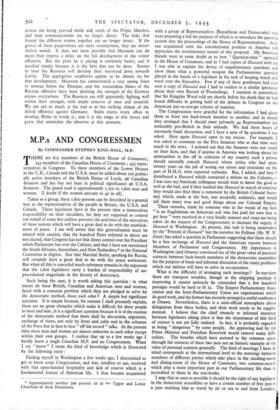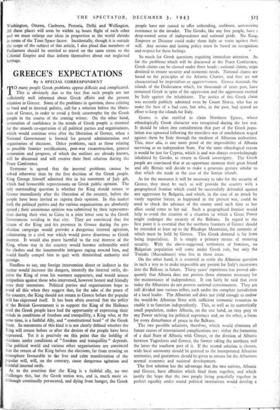M.P.s AND CONGRESSMEN
By COMMANDER STEPHEN KING-HALL, M.P.
THERE are 615 members of the British House of Commons ; 245 members of the Canadian House of Commons ; 435 repre- sentatives in Congress. To these members of the Lower Houses in the U.K., Canada and the U.S.A. must be added about too politic- ally active members of the British House of Lords, 96 Canadian Senators and last but not least in political significance 96 U.S.A. Senators. The grand total is approximately 1,5oo to 1,600 men and women. (I doubt if the women amount to 4o in all).
Taken as a group, these 1,600 persons can be described in a general way as the representatives of the people in Britain, the U.S.A. and Canada. These legislators have at the present time a tremendous responsibility on their shoulders, for they are supposed to control (on behalf of some 600 million persons) the activities of the executives, of three nations which will have a great deal to do with the establish- ment of peace. I am well aware that this generalisation must be treated with caution, that the hundred Peers referred to above are not elected, that Congress has not that direct control over the President which Parliament has over the Cabinet, and that I have not mentioned the South Africans, Australians, and New Zealanders,* or the National Committee in Algiers. Nor that Marshal Stalin, speaking for Russia, will certainly have a great deal to do with the peace settlement. But when all this is conceded much substance remains in the argument that the 1,600 legislators carry a burden of responsibility of un- precedented magnitude in the history of democracy.
Such being the case, it is worth asking this question : to what extent do these British, Canadian and American men and women, faced with a common problem which they are pledged to solve by the democratic method, know each other? A simple but significant question. It is simple because, for reasons I shall presently explain, there are no great obstacles which make it difficult for these people to meet and mix ; it is a significant question because it is of the essence of the democratic method that there shall be discussion, argument, exchange of views, not only by letter and cable and in the columns of the Press but in face to face " off the record " talks. At the present time these men and women are almost unknown to each other except within their own groups. I confess that up to a few weeks ago I hardly knew a single Canadian M.P. and no Congressmen. When I say " know " I mean the kind of knowledge which is illustrated by the following story : Finding myself in Washington a few weeks ago, I determined to get to know some Congressmen, and was, needless to say, received with that open-handed hospitality and lack of reserve which is a fundamental feature of American life. I thus became acquainted * Approximately another 30o persons sit in the Upper and Lower Chambers of these Dominions.
with a group of Representatives (Republican and Democratic) who were preparing a bill the purpose of which is to introduce the question system into the proceedings of the House of Representatives. Any- one acquainted with the constitutional position in America will appreciate the revolutionary nature of this proposal. My American friends were in some doubt as to how " Question-time " operated in the House of Commons, and as I had copies of Hansard with me I was able to explain the device of supplementary questions and show them what a powerful weapon the Parliamentary question placed in the hands of a legislator in his task of keeping watch and ward over the Executive. Few if any of these gentlemen had ever seen a copy of Hansard and I had to confess to a similar ignorance about their own Record of Proceedings. I mention in parenthesis that Sir Kingsley Wood told me shortly before his death that he had found difficulty in getting hold of the debates in Congress on the American pay-as-you-go scheme of taxation.
The Congressmen were grateful for the information I had given them as from one back-bench member to another, and in return they arranged that I should meet privately 44 Representatives not noticeably pro-British in their attitude. We had three hours of extremely frank discussion, and I have a note of 69 questions I was asked. Here again Hansard came to my rescue. For example, I was asked to comment on the Five Senators who at that time were much in the news. I pointed out that the Senators were not sound on their facts, and that if anyone in America was looking about for ammunition to fire off in criticism of my country such a person should naturally consult Hansard, where critics who had spent twenty years on the job of nosing out errors and omissions on the part of H.M.G. were reported verbatim. But, I added, and here I distributed a Hansard which contained a debate on the Colonies,— I was sure my American colleagues would wish to know the good as well as the bad, and if they studied this Hansard in search of criticism they would also find there a statement by the British Colonial Secre- tary which, made at the box, was assuredly authentic, and would tell them many true and good things about our Colonial Empire.
These remarks, made by someone who in the words of my host " is an Englishman on American soil who has paid his own fare to get here " were received in a very kindly manner and steps are being taken (at the request of the Congressmen) to increase the supply of Hansard in Washington. At present, this task is being undertaken by the "Friends of Hansard" but the member for Fulham (Mr. W. W. Astor) has asked a question in Parliament suggesting that there should be a free exchange of Hansard and the American reports between Members of Parliament and Congressmen. My experiences in Washington (and Ottawa) convinced me of the great value of personal contacts between back-bench members of the democratic assemblies for the purpose of frank and informal discussion of the many problems which our nations will have to solve in co-operation.
What is the difficulty of arranging such meetings ? In war-time there are transport troubles, though as the shipping positiqn is improving it cannot seriously be contended that a few hundred passages would be hard to fit in. The Empire Parliamentary Asso- ciation and the Inter-Parliamentary Union are organisations which do good work, and the former has recently arranged a useful conference at Ottawa. Nevertheless, there is a semi-official atmosphere about delegations from these bodies, and their work needs to be supple- mented. I believe that the chief obstacle to informal meetings between legislators taking place is that the importance of this kind of contact is not yet fully realised. In fact, it is probably regarded as being " dangerous " by some people. An approving nod by the Prime Minister and President Roosevelt would remove many diffi- culties. The benefits which have accrued to the common cause through the contacts of these two men are an historic example of the value of personal contacts generally. The kind of meetings I have in mind corresponds at the international level to the meetings between members of different parties which take place in the smoking-room and dining-room of the House of Commons, two common-rooms which play a more important part in our Parliamentary life than is accredited to them in the text-books.
I urge that as soon as possible it should be the right of any legislator in the democratic assemblies to have a certain number of free passes a year entitling him to travel by air or sea to and from London, Washington, Ottawa, Canberra, Pretoria, Delhi and Wellington. All these places will soon be within 24 hours flight of each other and we must enlarge our ideas in proportion as the world shrinks in terms of the Time/Space factor. Incidentally, though it is outside the scope of the subject of this article, I also plead that members of Parliament should be entitled -to travel on the same terms to the Colonial Empire and thus inform themselves about our neglected heritage.



























 Previous page
Previous page